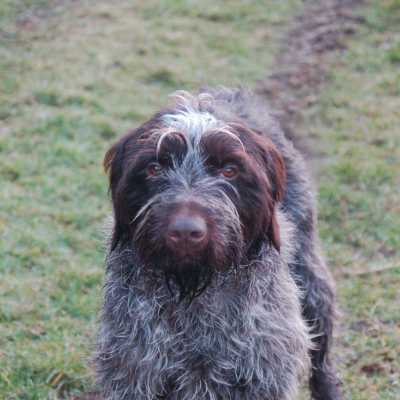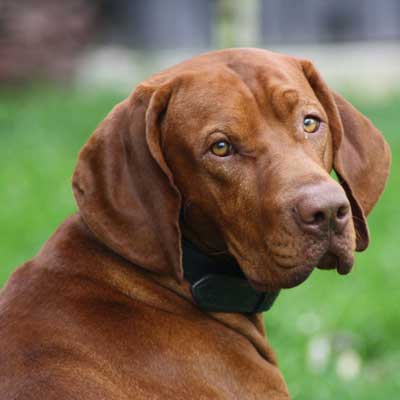Wire-Haired Pointing Griffon Korthals
Dynamic and attentive, he is always looking after the family
Already mentioned by Xenophon, used as « oysel dog » widespread in the whole of Europe under different names. The breed was renewed and improved by inbreeding, selection and training without any addition of foreign blood by E.K. Korthals during the second half of the 19th century. Since, the different national clubs have remained faithful to its precepts.
-
Head
Big and long, with harsh hair, thick but not too long;
moustache, beard and eyebrows well developed. -
Head - skull region
Skull: Not too broad. The upper lines of the skull and the muzzle are
parallel.
Stop: Not too pronounced. -
Head - facial region
Nose: Always brown.
Muzzle: Long and square, of the same length as the skull, bridge of the nose slightly convex.
Eyes: Dark yellow or brown, large, rounded surmounted but not
covered by the eyebrows, very intelligent expression.
Ears: Of medium size, not curled inwards, flat, set on level line
with the eyes, the short hair which covers them is more or less mixed with longer hairs. -
Neck
Moderately long, without dewlap. -
Body
Its length is markedly greater than the height at the withers
(from 1/20th to 1/10th).
Back: Strong.
Loin: Well developed.
Chest: Deep, not too wide, ribs slightly sprung. -
Tail
Carried horizontally or with the tip slightly raised, covered with thick hair but without fringing, generally should be docked by a third or a quarter.
If it were not shortened, it would be carried horizontally with its tip slightly raised. -
Forequarters
General appearance: Straight, vigorous, with thick hair. In action,
the forelegs are perfectly parallel.
Shoulder: Well set on, rather long, very oblique.
Forefeet: Round, strong, toes tight and arched. -
Hindquarters
General appearance: Covered with thick hair.
Thighs: Long and well muscled.
Hocks : Well angulated.
Hind feet: Round, strong, toes tight and arched. -
Gait / Movement
The hunting gait is the gallop, punctuated by periods of trot. The trot is extended. Catlike movement when walking up game. -
Coat - hair
Harsh and coarse, reminding of the touch of a wild boar’s bristles. Never curly or woolly.
Under the harsh top coat is a fine dense undercoat. -
Coat - colour
Preferably steel grey shade with brown (liver) patches or
self-coloured brown (liver) coat.
Frequently liver-roan or a close mixture of brown (liver) and white hairs. Equally permissible white and brown and white and orange coats. -
Size and weight
About 55 to 60 cm for males and 50 to 55 cm for females. -
Faults
Any departure from the foregoing points should be considered a fault and the seriousness with which the fault should be regarded should be in exact proportion to its degree and its effect upon the health and welfare of the dog -
Disqualifying faults
• Aggressive or overly shy dogs.
• Any dog clearly showing physical of behavioural abnormalities.
N.B.:
• Male animals should have two apparently normal testicles fully
descended into the scrotum.
• Only functionally and clinically healthy dogs, with breed
typical conformation should be used for breeding.





